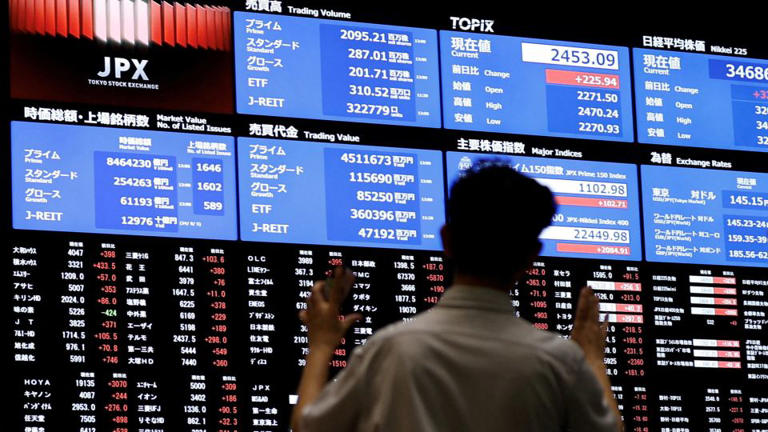Asian markets made solid gains on Wednesday, with Japanese shares reversing early losses after a central bank official downplayed the prospect of an immediate interest rate hike. The benchmark Nikkei 225 closed 1.2% higher, rebounding from losses of 2.5% earlier in the session, following fresh comments from Shinichi Uchida, deputy governor of the Bank of Japan (BOJ).
Market Reactions and Gains Across Asia
In South Korea, the Kospi index finished the day up by 1.8%, driven by strong performances in the technology and automotive sectors. Hong Kong’s Hang Seng index also saw a rise, closing 1.3% higher, bolstered by gains in financial and property stocks. Taiwan’s Taiex experienced the most substantial increase, surging 3.9%, as investors showed confidence in the semiconductor industry’s prospects.
These gains followed a period of significant volatility. Earlier in the week, the Nikkei suffered its most considerable daily loss since 1987, which triggered a sharp global sell-off and led to Wall Street experiencing its worst day since 2022. The recovery on Wednesday was attributed to Uchida’s comments, which provided some relief to jittery markets.
BOJ’s Stance on Interest Rates and Market Stability
Shinichi Uchida, the deputy governor of the Bank of Japan, indicated that recent market volatility might influence the BOJ’s monetary policy decisions. “We won’t raise interest rates when financial markets are unstable,” Uchida said in a speech to executives in the northern Japanese city of Hakodate. “As we’re seeing sharp volatility in domestic and overseas financial markets, it’s necessary to maintain current levels of monetary easing for the time being.”
Uchida’s remarks marked a shift from the BOJ’s recent hawkish stance, which had involved two interest rate hikes this year aimed at curbing inflation. The bank’s previous position had led many investors to unwind their yen carry trades—a strategy where investors borrow yen at low-interest rates to invest in higher-yielding assets abroad. This unwinding contributed to the recent market turbulence.
Currency Market Response and Trade Implications
Following Uchida’s comments, the US dollar surged more than 2% to 147.77 against the yen. This movement reversed the yen’s recent appreciation against the dollar, which had been driven by expectations of a more aggressive BOJ policy stance. The rapid appreciation of the yen had negatively impacted Japan’s stock market, as a stronger yen makes Japanese exports less competitive on the global stage.
Japan’s stock market, particularly the Nikkei, has been under pressure due to the yen’s strength. However, Uchida’s comments provided some relief, allowing the Nikkei to close higher. The broader Topix index, which includes a wider range of companies, also saw gains, closing 2.3% higher.
Global Market Context and Investor Sentiment
The positive turn in Asian markets followed gains on Wall Street the previous day. On Tuesday, the Dow Jones Industrial Average finished about 0.8% higher, while the S&P 500 and the Nasdaq Composite each closed up approximately 1%. These gains reflected investor optimism that central banks, including the BOJ, might adopt a more cautious approach to tightening monetary policy in the face of market volatility.
Economic Implications and Future Outlook
Uchida’s comments suggest that the BOJ is aware of the delicate balance between controlling inflation and maintaining market stability. The BOJ’s cautious approach aims to prevent further financial instability, which could derail Japan’s economic recovery. Japan has faced decades of low interest rates, which have encouraged investors to seek higher returns elsewhere. The recent market volatility underscores the challenges central banks face as they navigate the complexities of post-pandemic economic recovery.
Investors will be closely watching the BOJ’s next moves, as well as other central banks around the world, for further indications of how monetary policy might evolve. The global economic landscape remains uncertain, with ongoing geopolitical tensions and potential economic slowdowns in major economies.
Conclusion
In summary, Asian markets rallied on Wednesday, with Japanese shares leading the gains after comments from a BOJ official suggested that an immediate interest rate hike is unlikely amid market volatility. The positive sentiment extended across major Asian indices, contributing to a recovery from recent losses. Investors remain cautious but hopeful that central banks will manage the balance between curbing inflation and maintaining economic stability.
